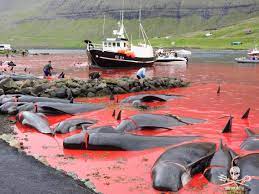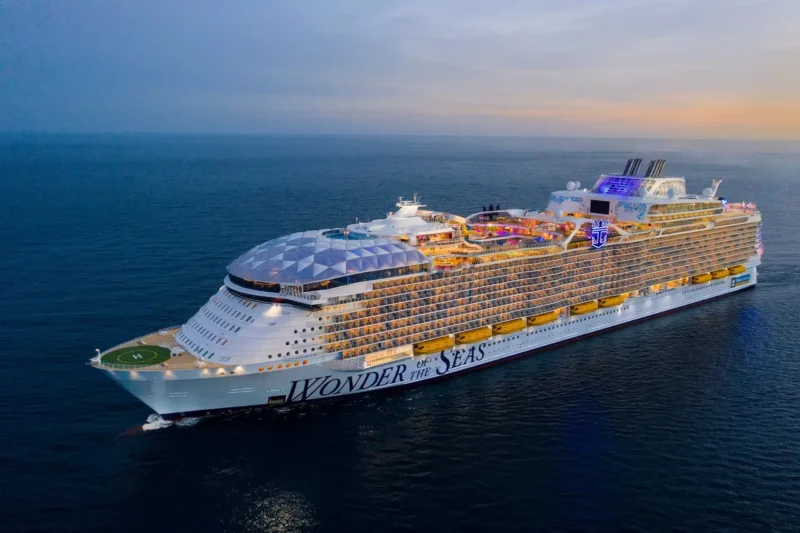
There has been widespread condemnation of a mass slaughter of dozens of whales in the Faroe Islands, in front of horrified passengers of a cruise ship which included members of a conservationist marine life group.
The deeply distressing practice was carried out as part of what is known locally as “grindadráp” and is seen as an important cultural tradition dating back to the 9th century. The Islanders have been under pressure to stop the frenzied attacks, but they choose to ignore outside views and maintain that it is part of their identity and also a sustainable way to gather a vital food source.
In total it is believed that 77 pilot whales were murdered during the hunt just off the port of the Danish territory’s capital, Torshavn, which involved some 50 boats and a helicopter, which together drove a large pod of whales towards a small beach where they were savagely butchered to death.
The UK-owned cruise ship Ambition had just arrived at the same time and witnessed much of the dreadful spectacle. Among them were members of ORCA, a marine life advocacy group who seek to protect whales and dolphins in European waters. They were aboard to help educate tourists on marine wildlife in a positive way, but instead found themselves in a killing zone.
Although pilot whales are protected under EU and UK law, the Faroe’s autonomous status means it can set its own laws and rules and therefore cannot be forced to end the regular activity. Indeed, figures made available show that this particular “grindadráp” or “grind” as it is also known, was the sixth of the season, which started in May, and the total number of whales slaughtered now exceeds 600, for the entire period.
Calves among the animals butchered
The whales were herded towards the beach by jet ski riders after a host of small boats had panicked them into heading inland. ORCA representatives confirmed that the hunt which lasted around 20 minutes, had included the clubbing of nine calves that took over 30 seconds to die. Others were brutally dealt with by up to 150 locals who worked to haul them ashore with hooks and finished them off with lances.
Participants reward
The whale meat and blubber is usually distributed among those who have participated in the killing and then sold in restaurants around the islands. Seemingly there are 23 designated “killing bays” at various spots in the 18-isle archipelago, which sit almost halfway between the Scottish Shetland Islands and Iceland.
Pilots close to endangerment
The long-finned pilot whales are a medium-sized marine mammal and technically a dolphin, that uses the North Atlantic as its habitat, and are known for their bulbous head and sickle-shaped flippers. Whilst they are not currently listed as an endangered species, they are listed in the US under the Marine Mammal Protection Act.
They live in social pods of up to twenty and then organized into a larger school of hundreds of animals. Sadly, such a social structure makes them easy targets for whalers. The local government, in an attempt to play down the practice, said the average catch is around 800 animals, which they add makes an insignificant impact on an overall pilot whale population of around 778,000.
Cruise ship executive issues apology
The Ambassador’s chief executive Christian Verhounig remarked how disappointed he was after what he described as weeks of trying to open constructive dialogue with the Faroese government and Visit Faroes on these issues they witnessed. He added: “We continue to educate guests and crew not to buy or eat any whale or dolphin meat and stand against any profiteering from commercial whaling and dolphin hunts.”
He went on to acknowledge that his company appreciated how distressing it must have been for his passengers, stating: “We would like to sincerely apologise to them for any undue upset this will have caused.”
Tearful activist gives graphic description
A clearly distressed Abi Groome, of ORCA, said: “There were 47 boats, and a helicopter and they have helped to kill 77 whales, including nine calves, some so small they still had their foetal folds. They dragged them into shallow water on the beach, put a hook down their blowhole, pulled them out and used lances to half decapitate them. There were teenagers and women involved. They tied the bodies to the back of their boats, dragged them across to the harbour and they were pulled out by cranes, which was when we counted them.”
“Barbaric” practice not a good image
Sally Hamilton, CEO of ORCA questioned whether the gruesome spectacle was quite the image that the Faroese authorities really wanted to present to tourists. She said: “If they believe that slaughtering whales is more important than creating a sustainable tourist industry for the wider benefit of their people, then they should be honest enough to say so. At present, they seem to want to have their whales and kill them.”
Dominic Dyer, Born Free’s policy advisor, said the conservation group condemns the continual mass killing of whales and dolphins on the Faroe Islands. He added: “These highly intelligent marine mammals are being subject to an outdated, mindless and barbaric practice which would surely shock and disgust any right-minded person who was to witness it.”
Many locals in favour of evolving grindadráp
Claire Bass, the senior director of campaigns and public affairs at Humane Society International/UK, made the point that regardless of the hunts having a long cultural history, there was evidence coming out of polls that suggested that around half of Faroe Islanders believe that the hunts could end if their cultural and traditional relationship with whales could evolve, but be preserved in other ways.
“We urge those taking part in the hunts to begin a new chapter in their centuries-long history with whales, stopping the killing out of respect for the protection these animals so urgently need from the many threats they face in our degraded oceans.”
Animal Rights target
Since 1948, Grindadráp has been regulated by the Faroese authorities, required its participants to be trained and be supervised by police. The practice has been under increasing scrutiny since the eighties with concerns over toxicity issues and Animal Rights campaigners targetting the hunts with protests and occasional direct interventions.
Self-government
The Faroe Islands are a self-governing territory under the external sovereignty of the Kingdom of Denmark. However, whilst the Danes are a member state of the European Union, the Faroe’s have chosen to remain outside the Union.
Accordingly, they are free to negotiate their own trade and fisheries agreements with the EU and other countries, and whilst local government has invested in the tourism sector, fishing and marine industries remain the region’s leading economic driver.






0 Comments